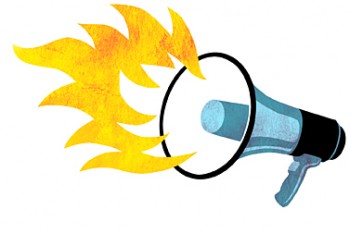Tag: internet
Hatefully yours
23 December 2011 | Non-fiction, Tales of a journalist
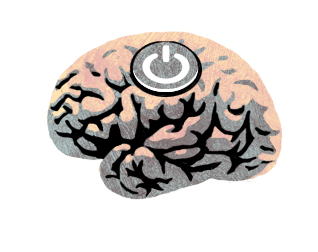
Illustration: Joonas Väänänen
In the new media it’s easy for our pet hatreds to be introduced to anyone who is interested. And of course everyone is interested, how else could it be? Jyrki Lehtola investigates
Twitter, Facebook, Twitter, Twitter, Twitter, Facebook, Twitter, how can we get the revenue model to work by using our old media, Twitter, Facebook, Twitter, Twitter, hey, what about that revenue model of ours, Twitter.
The preceding is a poignant summary of what the Finnish media was like in 2011 when the rules of the game changed like they have changed every year. And we still don’t even fully understand what the game is supposed to be. More…
Are we stupid or what?
14 October 2011 | Non-fiction, Tales of a journalist
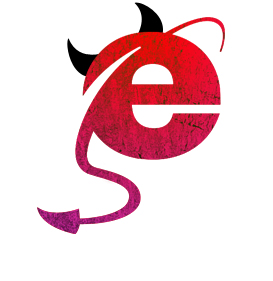 Are we dumbed down by the Internet? Jyrki Lehtola takes a look at who might be to blame
Are we dumbed down by the Internet? Jyrki Lehtola takes a look at who might be to blame
Because I am not a historian and Googling this topic would take more than two clicks, I do not know whether Gutenberg was accused of ruining the future of young people and making adults even stupider.
There would have been reason to. The invention of the printing press took us away from what is truly important. The world was better before Gutenberg.
People knew themselves and each other; they were connected to nature and what really matters. After Gutenberg invented the printing press, those poor people were forced to read books, creating an ever-worsening state of helplessness. More…
Head in a cloud
27 May 2011 | Articles, Non-fiction
Thinking, reading, writing, buying… Teemu Manninen explores the new freedoms, literal and poetic, offered by cloud computing, where what you can do is no longer limited by what you happen to have on your computer
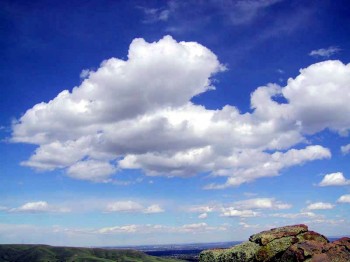
High in the sky: cumulus clouds. Photo: Michael Jastremski, Wikimedia
I’m sitting in a rocking chair on the porch of a cottage by a lake. My fingers tap and slide on the surface of a black glass panel, a kind of instrument used in the composing of literature. Each tap equals a letter, a series of taps equals a word, a symphony of taps becomes a paragraph, a paragraph an essay.
The glass panel remembers these letters and words and the writings they become, and knows them by their names, but it could also record anything I see or hear. I could even talk to it and it would understand my commands, as if some nether spirit were captured inside, a magic genie slaved to do my bidding. More…
Lucky strikes
12 August 2010 | This 'n' that
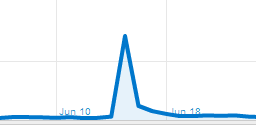
Stumbled upon: readers find Tommi Musturi's comic strip (June 10–June 18)
When Books from Finland was a printed journal, it was relatively easy to define its readership – now it is different: we are a part of the internet’s ecosystem, its surging and multifarious mass of knowledge.
Those who visit our pages may have the most diverse motives for wanting to read our articles – and they may travel surprising itineraries before arriving on Books from Finland’s pages, as we found out recently: StumbleUpon is still a fairly little-known service in Finland. Thus it took a while before we realised why so many of the comments about our piece on Tommi Musturi’s wordless comic strip, on colour and friendship, began with the words ‘I stumbled upon’… More…
Vox bloody populi
25 March 2010 | Columns, Tales of a journalist
How does it sound, the people’s voice? Loud and sometimes clear perhaps, but, as columnist Jyrki Lehtola finds, more often than not shrill and puerile
According to a study carried out by Finland’s biggest newspaper, Helsingin Sanomat, 60 per cent of Finns oppose the idea of allowing more immigrants into Finland.
The chancellor of the University of Helsinki, Ilkka Niiniluoto, is concerned about freedom of speech. Immigration researchers no longer dare participate in public debate, because they find themselves the target of death threats. More…
Second nature
15 February 2010 | Articles, Non-fiction
 We hear a lot about how the internet is going to transform the reading and the marketing of books. But what about the act of writing? Teemu Manninen reports from the frontline of a new generation of authors for whom life has always been digital
We hear a lot about how the internet is going to transform the reading and the marketing of books. But what about the act of writing? Teemu Manninen reports from the frontline of a new generation of authors for whom life has always been digital
When we think of the future of publishing in these times of electronic reading devices, audiobooks, and the internet, when it seems as if the whole material being of literature is about to be transformed, we may ask how the marketing of books will change.
What happens when publishing goes online? How will authors cope with the new culture of the internet? More…
It’s (virtually) Christmas!
28 November 2009 | This 'n' that
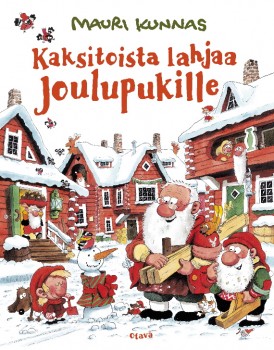
Father Christmas / Santa Claus by Mauri Kunnas
What to give the man who has everything? In prizewinning children’s author and illustrator Mauri Kunnas’s Twelve Gifts for Santa, Zac, one of Father Christmas’s little helpers, decides to give him twelve good deeds. Doing so is not as easy as it looks, however, and you can follow the twists and turns of the story on the Kidzone Finland advent calendar from Tuesday, 1 December, with one window opening each day until Christmas Eve.
Mauri Kunnas (born 1950) published the first of his popular picture books for children in 1980; entitled Koiramäen talossa (‘Doghill Farm’), it describes – with the accuracy of a treatise on folklore studies – life in a country farmhouse at the end of the 19th century. His hilarious canine characters, in more than forty books, have now found readers in almost thirty languages. More…
Re-inventing the book: on the papernet, pod and the unbook
20 May 2009 | Articles, Non-fiction
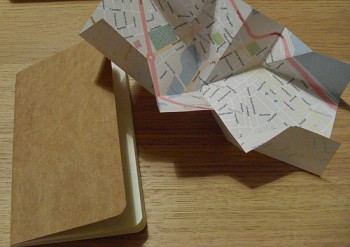
Mind-map: using the papernet to produce books just for you. - Photo: Brian Suda
Just as Books from Finland finally goes online, the brightest minds of the internet are forecasting a return to paper. In the first of a series of articles, the poet and scholar Teemu Manninen celebrates the second coming of the book
Last week I did something I’ve never done before. I uploaded the manuscript of my third book on to the website Books on Demand, an internet print-on-demand (‘pod’) service, chose the format (a large 19×22 cm size with a hard cover), selected a picture for my cover, copy-pasted a poem by Clark Ashton Smith – an American science fiction and fantasy writer – on the back flap and ordered a copy. More…
I hate your Face(book)
5 May 2009 | Columns, Tales of a journalist
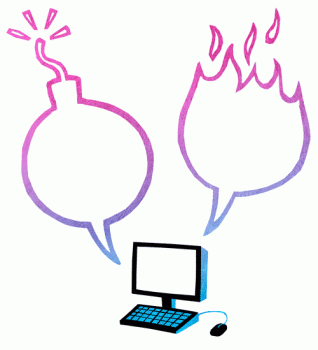
Illustration: Joonas Väänänen
Just how ‘free’ is free speech? Pay a visit to any internet chatroom, and you’ll see. In the first column of a new series called ‘Journalist’s tales’, the media critic Jyrki Lehtola investigates intolerance on the internet
First there was utopia. Then came people, and utopia suffered.
As with all new inventions, from electricity to the atom bomb, internet social networks were supposed to make our lives better. They were supposed to give us license to network, to participate, to get to know each other, to get reacquainted, to flirt, to find an extramarital lover and to be connected to as many people as possible in as many inconsequential ways as possible. More…
All in good time
17 April 2009 | Letter from the Editors
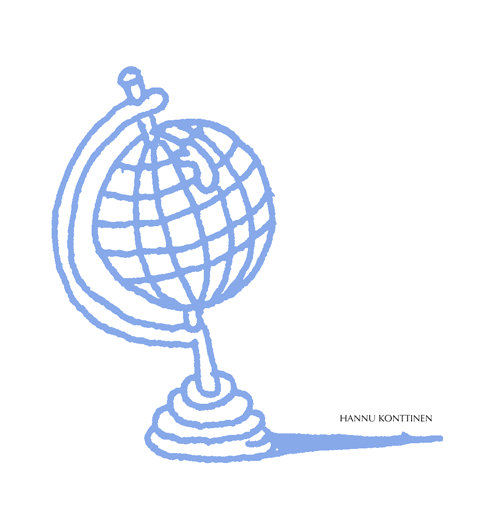 So here it is, Books from Finland’s new website. From the decision to abandon print and go online it’s been a long and sometimes circuitous journey to get here – a journey that has been far longer in the imagining than in the making. More…
So here it is, Books from Finland’s new website. From the decision to abandon print and go online it’s been a long and sometimes circuitous journey to get here – a journey that has been far longer in the imagining than in the making. More…
Digital dreams
4 February 2009 | Essays, Non-fiction
In this specially commissioned article, the first for the new Books from Finland website, Leena Krohn contemplates the internet and the invisible limits of literature.
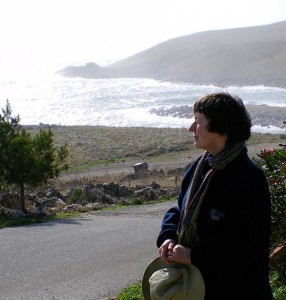
Leena Krohn on the way to Cape Tainaron, Southern Peloponnese, Greece; this is where Europe ends. Her novel entitled Tainaron appeared in 1985. – Photo: Mikael Böök (2008)
The world wide web, whose services most of us now use for work or entertainment, is a greater invention than we have, perhaps, realised up till now: according to the writer Leena Krohn, it is nothing less than an evolutionary leap
Technology combats the limitations of our senses, geography, and time. The human eye can’t compete with the visual acuity of an eagle, or even a cat, but with the best telescopes it can see into the early history of the universe, with new electron microscopes it can distinguish individual atoms.
The human senses nevertheless have an unbelievably broad bandwidth. About a million times more data flows to our brains by means of our senses than we could ever grasp consciously. More…

